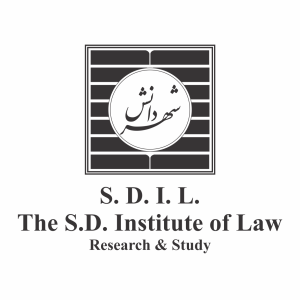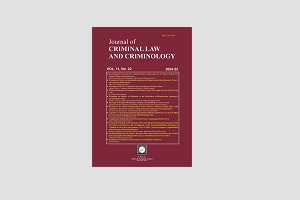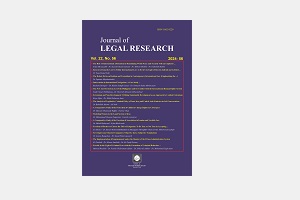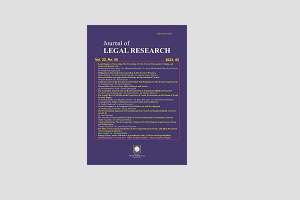Journal of
Criminal Law and Criminology
Number 6
Vol. III ● No. 2
Autumn 2015 – Winter 2016
Managing Editor: Vahid Eshtiagh
Editor-in-Chief: Mohammad Ashoori
CONTENTS
Articles
Terrorism as an International Crime: Special Tribunal for Lebanon’s Approach to Definition of International Terrorism
Ebrahim Beigzadeh (Ph.D.) & Mona Mirzadeh
The Effect of the Press on Violence and Feeling Insecure
Ali Saffari (Ph.D.) & Razieh Saberi
Mens Rea of Crime of Torture in Light of International Criminal Court
Mahdi Abdulmaleki & Seyed Ghasem Zamani (Ph.D.)
The Right of Suspects and Accused to Lawyer in Compliance with Human Rights Instruments
Rajab Goldoust Jooybari (Ph.D.) & Mehran Ibrahimi Manesh
A Comparative Study between Computer Fraud and Traditional Fraud by looking at E-commerce Security
Seyed Hossein Tabatabaei (Ph.D.)
The Role of Victim in England Criminal Law
Seyed Alireza Mirkamali (Ph.D.)
Articles
Terrorism as an International Crime: Special Tribunal for Lebanon’s Approach to Definition of International Terrorism
Ebrahim Beigzadeh
Professor of International Law, Faculty of Law, Shahid Beheshti University
&
Mona Mirzadeh
Ph.D. Candidate in International Law, Faculty of Law, Shahid Beheshti University
Abstract:
Pursuant to the Special Tribunal for Lebanon’s Rules of Evidence and Procedure, on 21 January 2011 Pre-Trial Judge has submitted to the Appeals Chamber some questions of law that require resolution before he can determine whether to confirm the indictment currently before him.
One of the most important questions was about definition of international terrorism. In other word, taking into account the fact that the Statute refers exclusively to the relevant provisions of the Lebanese Criminal Code in order to define the notion of terrorist acts, should the Tribunal also take into account the relevant applicable international law? The Appeals Chamber argued that the narrow interpretation of the “means” element under Lebanese jurisprudence should be interpreted in accordance with the definition of terrorism under international law.
As a first international Tribunal with jurisdiction ratione materiae over the crime of terrorism, STL believes that a customary rule of international law regarding the international crime of terrorism has indeed emerged. This customary rule requires the following three key elements: (i) the perpetration of a criminal act (such as murder, kidnapping, hostage-taking, arson, and so on), or threatening such an act; (ii) the intent to spread fear among the population (which would generally entail the creation of public danger) or directly or indirectly coerce a national or international authority to take some action, or to refrain from taking it; (iii) when the act involves a transnational element.
Keywords: definition of international terrorism, Special Tribunal for Lebanon, international crimes, determination of customary international law, means by which terrorism is carried out.
The Effect of the Press on Violence and Feeling Insecure
Ali Saffari
Assistant Professor of Faculty of Law, Shahid Beheshti University
&
Razieh Saberi
Ph.D. Student in Faculty of Law, Shahid Beheshti University
Abstract:
Fear of crime and feeling insecure as e result, is one of social problems in todays societies. The press can play a vital role in producing such a feeling. This paper is therefore, planned to analyze the effect of the press on violence and feeling insecure in the community by first looking at the current literature and then by a survey which tries to evaluate the effect of four variants including the level of the knowledge, sex, education in three different towns (Tehran, Mashhad, Qom) on people. This was carried out in1393 by distributing 180 questionnaires amongst people in the three mentioned towns. The data gathered was analyzed by P-Value and Chi-squared test. The result shows that some of the variants have been effective on feeling insecure and violence, but the others did not have any effect on such a feeling of people studied.
Keywords: feeling in secure, public opinion, fear of crime, violence, the effect of press.
Mens Rea of Crime of Torture in Light of International Criminal Court
Mahdi Abdulmaleki
Law Department, Najaf Abad Branch, Islamic Azad University, Najaf Abad, Iran
&
Seyed Ghasem Zamani
Law Department, Najaf Abad Branch, Islamic Azad University, Najaf Abad, Iran
Associate Professor of Law and Political Science Faculty, Allameh Tabataba’i University-Tehran-Iran (Corresponding Author)
Abstract:
Meeting a crime beside the material element needs the mental element namely general purpose and in some crimes special purpose. For this reason, article 1 of convention against torture and other cruel, inhuman or degrading treatment or punishment (1984) provides meeting torture requires, beside act intention, special purpose such as obtaining information or confession. Some tribunals such as ICTY and ICTR considers this article as a customary rule and their interpretations form torture has been based upon this article, but the European court of human rights in some its judgments tend to treat torture as a material or absolute crime. The statute of ICC also in article 7 (2) (e) – in crimes against humanity- treat torture as a material crime. Although it seems this view is the most comprehensive form of prohibition of torture, statute, immediately, in article 8 (2) (a) (2) and (2)(c)(1), unlike article 7 without providing any certain definition of torture, classifies this crime as a war crime and also preparatory commission of statute believes that existence of special purpose is necessary for meeting torture as a war crimes. Therefore, it seems criminal justice necessitates that special purpose must be removed from constituting elements of crime of torture.
Keywords: torture, Mens Rea, special purpose, International Criminal Court.
The Right of Suspects and Accused to Lawyer in Compliance with Human Rights Instruments
Rajab Goldoust Jooybari
Assistant Professor of Shahid Beheshti University, Tehran
&
Mehran Ibrahimi Manesh
Master of Criminal Law and Criminology, Law Faculty of Payam Noor University, Tehran
Abstract:
The Criminal Procedure Code 2013, besides confirming the right of accused persons to advocate assistance in elementary investigation, none credit of investigations achieved without advocate, obligation of judicial authority to issue the warranty of non achievement of advocate to case, it’s being objectionable in 3 days, recognition of the right of accused to have public defender in elementary investigations in crimes that are punished by death penalty or life imprisonment, assignment of public defender for children and adolescents under 18 years old and assignment of public defender for insane people, has taken basic steps toward regarding defense rights of accused and achieve fair proceeding and accomplishment of Iran international obligations. However, there are still limitations in accused person’s accessibility to chosen advocate and his/her accessibility to the case in crimes against national and international security and if the judge, considers accessibility to case contrary to public morals. The most important situation in ignoring accused right to have his/her own advocate is sub paragraph of Art 48 of Reformed Criminal Procedure Code 2015 that is criticized due to some faults including non compliance with Iranian Constitutional Law and international human rights instruments and people’s right of choice. Also there are some criticisms in that it leads to violations of accused persons and their advocates’ rights.
Keywords: suspected rights, accused rights, defense advocate, and chosen defense advocate, public defender.
A Comparative Study between Computer Fraud and Traditional Fraud by looking at E-commerce Security
Seyed Hossein Tabatabaei
Ph.D. of International Law from the University of Nice Sophia Antipolis
(Institut du droit de la paix et du developpement)
Abstract:
This article is about a computer fraud comparing with a traditional fraud. The purpose of the author is at first, to present the phenomenon of the cyber crime, computer fraud and a glimpse of the traditional fraud. Secondly, a comparative study between the computer fraud and the traditional fraud (in particular in the Iranian legal system). The author hopes that this article can reinforce the research infrastructure in this area. In fact, the policy and legislation dealing with this new type of crime will be more effective and useful with scientific and research support. Remember that this area is an interdisciplinary field that requires cooperation among legal professionals and computer science.
Keywords: computer fraud, traditional fraud, cyber crime, e-commerce.
The Role of Victim in England Criminal Law
Seyed Alireza Mirkamali
Assistant Professor at Shahid Beheshti University, Tehran
Abstract:
Trial proceedings in English legal system is adversarial and is similar to trial in civil actions; as parties present their cases and promote the action in contrast with each other. The difference is that unlike civil actions, state is represented by prosecution and the second party is an individual. So, it seems that there is no place for victim in this action, in contrast with the fact that the real harm is inflicted on her. On the other hand, if there is no action in criminal process on behalf of the victim, she nevertheless will be considered in trial phases like reporting of crime, victim impact statement and complaint. In fact, one can say that the victim is merely the starter of prosecution and is not a main actor in criminal process. Unlike the fact that her name is a part of many of the criminal proceedings steps, but her position is mainly reactive and restricted to informing, redress and restitution for harms inflicted.
Keywords: the victim, prosecution, criminal law of England, prosecutor.





